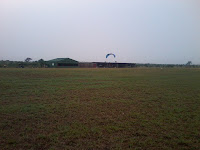If we are learning anything this week from all the calls we’re getting, it is that the communities are as varied in personality as they are enthusiastic about the drops this last week and the start of ETCHE!
With our response rate about 65%, we’ve heard from
communities as large as 1500 and some as small as 350. Although each community targeted has in
common that they are located on the lake’s edge, they have so far each been
unique in relation to factors such as distance to the nearest clinic, existence
of a school and/or latrines, and community water source. In talking with community members, it
continues to be eye-opening when they share some of their challenges with us
via crackly phone lines. For example,
ETCHE bag #A019 which landed in Akotoe, was received by a local school teacher
who, in describing his community, told us that his people are forced to get
their water from the lake because the water from the two boreholes nearby have
become salty and undrinkable.
 It has been interesting to hear from the communities how
they received their ETCHE bags. For
example, a representative from Dzogba called me yesterday to apologize for not
calling sooner but that their school children had only just found the bag in
the wooded part of their community that day.
He informed me that the community has called a meeting for tomorrow and
will call me again once they have read the letter from MoM and had a chance to
discuss it with the people.
It has been interesting to hear from the communities how
they received their ETCHE bags. For
example, a representative from Dzogba called me yesterday to apologize for not
calling sooner but that their school children had only just found the bag in
the wooded part of their community that day.
He informed me that the community has called a meeting for tomorrow and
will call me again once they have read the letter from MoM and had a chance to
discuss it with the people.
My favorite part by far though has been the initial and
continued interaction with community members.
The excitement in their voice is unmistakable. When you answer an unknown number on your
phone and the chipper voice on the other end immediately says happily, “Good
Afternoon Madam! We are pleased to have
received the bag from your airplane and we wanted to let you be aware that we
want to participate!”
Many of the phone calls from the communities have come with
a representative on the direct line and you can hear the entire community in
the background as they all wait for this initial contact. In many cases, the community’s chief (or Dademantse, as he is called here) or a
teacher is usually the one to make initial contact, but that has provided a
perfect venue within which to answer questions and explain to them our vision
for a community-identified health volunteer.
We will do one more round of pinging drops in the coming
week or two in order to gather information about the communities, but we hope
to have our kickoff and initial training in the weeks following.

























